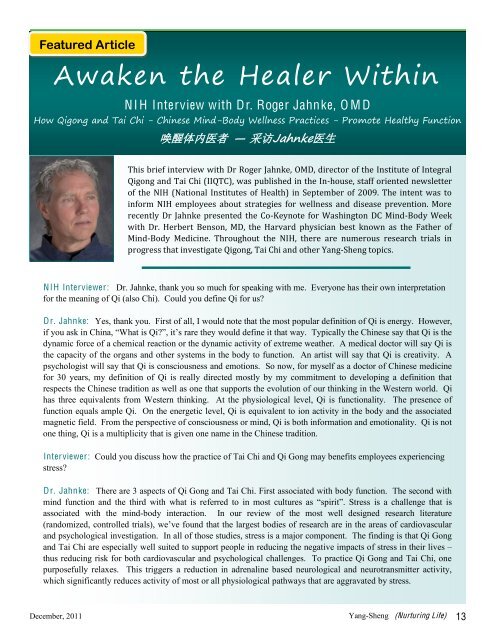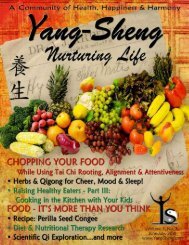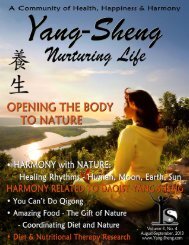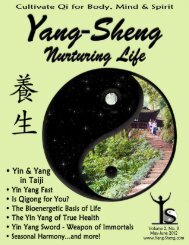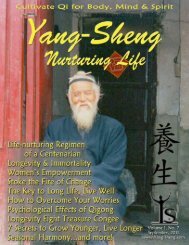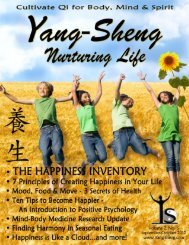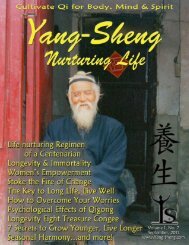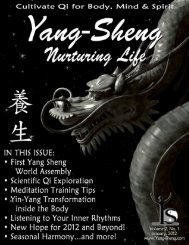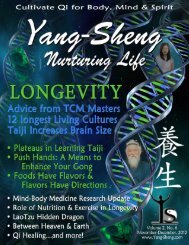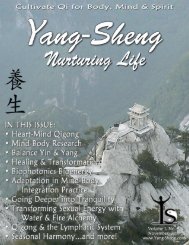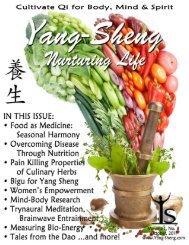Download the December issue of Yang-Sheng as
Download the December issue of Yang-Sheng as
Download the December issue of Yang-Sheng as
Create successful ePaper yourself
Turn your PDF publications into a flip-book with our unique Google optimized e-Paper software.
Featured Article<br />
Awaken <strong>the</strong> Healer Within<br />
NI H Interview with Dr. Roger Jahnke, O M D<br />
How Qigong and Tai Chi - Chinese Mind-Body Wellness Practices - Promote Healthy Function<br />
唤醒体内医者 — 采访Jahnke医生<br />
This brief interview with Dr Roger Jahnke, OMD, director <strong>of</strong> <strong>the</strong> Institute <strong>of</strong> Integral<br />
Qigong and Tai Chi (IIQTC), w<strong>as</strong> published in <strong>the</strong> In‐house, staff oriented newsletter<br />
<strong>of</strong> <strong>the</strong> NIH (National Institutes <strong>of</strong> Health) in September <strong>of</strong> 2009. The intent w<strong>as</strong> to<br />
inform NIH employees about strategies for wellness and dise<strong>as</strong>e prevention. More<br />
recently Dr Jahnke presented <strong>the</strong> Co‐Keynote for W<strong>as</strong>hington DC Mind‐Body Week<br />
with Dr. Herbert Benson, MD, <strong>the</strong> Harvard physician best known <strong>as</strong> <strong>the</strong> Fa<strong>the</strong>r <strong>of</strong><br />
Mind‐Body Medicine. Throughout <strong>the</strong> NIH, <strong>the</strong>re are numerous research trials in<br />
progress that investigate Qigong, Tai Chi and o<strong>the</strong>r <strong>Yang</strong>‐<strong>Sheng</strong> topics.<br />
NIH Interviewer: Dr. Jahnke, thank you so much for speaking with me. Everyone h<strong>as</strong> <strong>the</strong>ir own interpretation<br />
for <strong>the</strong> meaning <strong>of</strong> Qi (also Chi). Could you define Qi for us?<br />
Dr. Jahnke: Yes, thank you. First <strong>of</strong> all, I would note that <strong>the</strong> most popular definition <strong>of</strong> Qi is energy. However,<br />
if you <strong>as</strong>k in China, “What is Qi?”, it’s rare <strong>the</strong>y would define it that way. Typically <strong>the</strong> Chinese say that Qi is <strong>the</strong><br />
dynamic force <strong>of</strong> a chemical reaction or <strong>the</strong> dynamic activity <strong>of</strong> extreme wea<strong>the</strong>r. A medical doctor will say Qi is<br />
<strong>the</strong> capacity <strong>of</strong> <strong>the</strong> organs and o<strong>the</strong>r systems in <strong>the</strong> body to function. An artist will say that Qi is creativity. A<br />
psychologist will say that Qi is consciousness and emotions. So now, for myself <strong>as</strong> a doctor <strong>of</strong> Chinese medicine<br />
for 30 years, my definition <strong>of</strong> Qi is really directed mostly by my commitment to developing a definition that<br />
respects <strong>the</strong> Chinese tradition <strong>as</strong> well <strong>as</strong> one that supports <strong>the</strong> evolution <strong>of</strong> our thinking in <strong>the</strong> Western world. Qi<br />
h<strong>as</strong> three equivalents from Western thinking. At <strong>the</strong> physiological level, Qi is functionality. The presence <strong>of</strong><br />
function equals ample Qi. On <strong>the</strong> energetic level, Qi is equivalent to ion activity in <strong>the</strong> body and <strong>the</strong> <strong>as</strong>sociated<br />
magnetic field. From <strong>the</strong> perspective <strong>of</strong> consciousness or mind, Qi is both information and emotionality. Qi is not<br />
one thing, Qi is a multiplicity that is given one name in <strong>the</strong> Chinese tradition.<br />
Interviewer: Could you discuss how <strong>the</strong> practice <strong>of</strong> Tai Chi and Qi Gong may benefits employees experiencing<br />
stress?<br />
Dr. Jahnke: There are 3 <strong>as</strong>pects <strong>of</strong> Qi Gong and Tai Chi. First <strong>as</strong>sociated with body function. The second with<br />
mind function and <strong>the</strong> third with what is referred to in most cultures <strong>as</strong> “spirit”. Stress is a challenge that is<br />
<strong>as</strong>sociated with <strong>the</strong> mind-body interaction. In our review <strong>of</strong> <strong>the</strong> most well designed research literature<br />
(randomized, controlled trials), we’ve found that <strong>the</strong> largest bodies <strong>of</strong> research are in <strong>the</strong> are<strong>as</strong> <strong>of</strong> cardiov<strong>as</strong>cular<br />
and psychological investigation. In all <strong>of</strong> those studies, stress is a major component. The finding is that Qi Gong<br />
and Tai Chi are especially well suited to support people in reducing <strong>the</strong> negative impacts <strong>of</strong> stress in <strong>the</strong>ir lives –<br />
thus reducing risk for both cardiov<strong>as</strong>cular and psychological challenges. To practice Qi Gong and Tai Chi, one<br />
purposefully relaxes. This triggers a reduction in adrenaline b<strong>as</strong>ed neurological and neurotransmitter activity,<br />
which significantly reduces activity <strong>of</strong> most or all physiological pathways that are aggravated by stress.<br />
<strong>December</strong>, 2011 <strong>Yang</strong>-<strong>Sheng</strong> (Nurturing Life) 13


